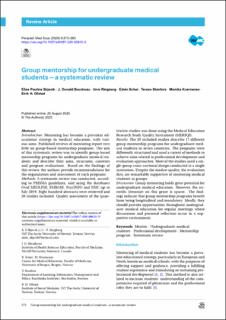| dc.contributor.author | Skjevik, Elise | |
| dc.contributor.author | Boudreau, J. Donald | |
| dc.contributor.author | Ringberg, Unni | |
| dc.contributor.author | Schei, Edvin | |
| dc.contributor.author | Stenfors, Terese | |
| dc.contributor.author | Kvernenes, Monika | |
| dc.contributor.author | Ofstad, Eirik Hugaas | |
| dc.date.accessioned | 2021-05-19T11:39:01Z | |
| dc.date.available | 2021-05-19T11:39:01Z | |
| dc.date.created | 2020-10-05T12:30:53Z | |
| dc.date.issued | 2020 | |
| dc.Published | Perspectives on Medical Education (PME). 2020, 1-9. | |
| dc.identifier.issn | 2212-2761 | |
| dc.identifier.uri | https://hdl.handle.net/11250/2755678 | |
| dc.description.abstract | Introduction
Mentoring has become a prevalent educational strategy in medical education, with various aims. Published reviews of mentoring report very little on group-based mentorship programs. The aim of this systematic review was to identify group-based mentorship programs for undergraduate medical students and describe their aims, structures, contents and program evaluations. Based on the findings of this review, the authors provide recommendations for the organization and assessment of such programs.
Methods
A systematic review was conducted, according to PRISMA guidelines, and using the databases Ovid MEDLINE, EMBASE, PsycINFO and ERIC up to July 2019. Eight hundred abstracts were retrieved and 20 studies included. Quality assessment of the quantitative studies was done using the Medical Education Research Study Quality Instrument (MERSQI).
Results
The 20 included studies describe 17 different group mentorship programs for undergraduate medical students in seven countries. The programs were differently structured and used a variety of methods to achieve aims related to professional development and evaluation approaches. Most of the studies used a single-group cross-sectional design conducted at a single institution. Despite the modest quality, the evaluation data are remarkably supportive of mentoring medical students in groups.
Discussion
Group mentoring holds great potential for undergraduate medical education. However, the scientific literature on this genre is sparse. The findings indicate that group mentorship programs benefit from being longitudinal and mandatory. Ideally, they should provide opportunities throughout undergraduate medical education for regular meetings where discussions and personal reflection occur in a supportive environment. | en_US |
| dc.language.iso | eng | en_US |
| dc.publisher | Springer | en_US |
| dc.rights | Navngivelse 4.0 Internasjonal | * |
| dc.rights.uri | http://creativecommons.org/licenses/by/4.0/deed.no | * |
| dc.title | Group mentorship for undergraduate medical students—a systematic review | en_US |
| dc.type | Journal article | en_US |
| dc.type | Peer reviewed | en_US |
| dc.description.version | publishedVersion | en_US |
| dc.rights.holder | Copyright 2020 The Authors | en_US |
| cristin.ispublished | true | |
| cristin.fulltext | original | |
| cristin.qualitycode | 1 | |
| dc.identifier.doi | 10.1007/s40037-020-00610-3 | |
| dc.identifier.cristin | 1837061 | |
| dc.source.journal | Perspectives on Medical Education (PME) | en_US |
| dc.source.pagenumber | 272–280 | en_US |
| dc.identifier.citation | Perspectives on Medical Education (PME). 2020, 9, 272–280 | en_US |
| dc.source.volume | 9 | en_US |

